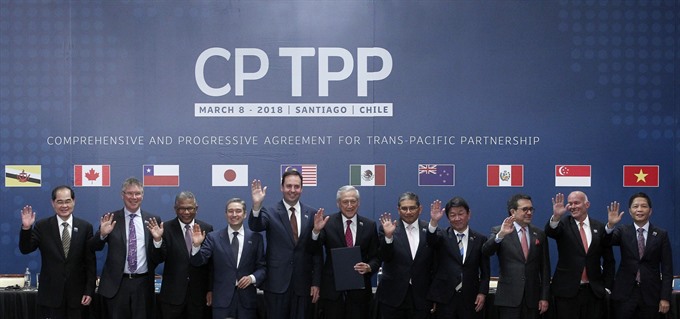 World
World

Eleven nations signed a slimmed-down version of the Trans-Pacific Partnership (TPP) trade agreement on Thursday, moving to lower tariffs just as US President Donald Trump raised them after withdrawing from the deal.
 |
| Vietnamese Minister of Industry and Trade Trần Tuấn Anh (first right) takes photo with representatives of members of Trans-Pacific Partnership (TPP) after the signing agreement ceremony in Santiago, Chile on Thursday. — AFP/VNA Photo |
SANTIAGO — Eleven nations signed a slimmed-down version of the Trans-Pacific Partnership (TPP) trade agreement on Thursday, moving to lower tariffs just as US President Donald Trump raised them after withdrawing from the deal.
The TPP, which would have represented 40 percent of the global economy and nearly one-quarter of its trade, was left for dead after Trump pulled out to pursue his "America First" agenda.
But the revamped deal, now known as the Comprehensive and Progressive Agreement for Trans-Pacific Partnership (CPTPP), is still a significant achievement and a victory for openness, its supporters said at the signing ceremony in Santiago, Chile.
"We are proud to have completed this process, sending a strong message to the international community that opening markets, economic integration and international co-operation are the best tools to create economic opportunity and prosperity," said Chilean President Michelle Bachelet.
The pact includes Australia, Brunei, Canada, Chile, Japan, Malaysia, Mexico, New Zealand, Peru, Singapore and Vietnam, representing together 13.5 per cent of the global economy.
The 11 states form a market of 500 million people, greater than that of the European Union.
The deal was signed just before Trump slapped steep tariffs on imported steel and aluminum, setting up what many allies both at home and abroad warn could escalate into a global trade war.
Former President Barack Obama’s administration pushed for the TPP as a counterweight to growing Chinese commercial power. It not only cut tariffs but required members to comply with a high level of regulatory standards in areas like labour law and environmental protection.
Fernando Estenssoro, of Chile’s University of Santiago, says snubbing the pact is "a type of suicide" for the United States.
’A new standard’
Washington’s absence leaves an open path for China -- which remains excluded from the deal -- as it negotiates separately with Asian countries and New Zealand.
The CPTPP aims to slash tariffs among the 11 members and foster trade to boost growth.
"We’re very proud... to show the world that progressive trade is the way forward," said Canadian Trade Minister Francois-Philippe Champagne as officials gathered for the signing ceremony.
Felipe Lopeandia, Chile’s top trade negotiator, said the deal will "send a political signal to the world and to the United States itself, that this is a global agreement".
It is one which remains hugely significant, said Ignacio Bartesaghi of the Catholic University of Uruguay’s business school.
"There is no trade agreement involving that number of countries, and one that has 30 chapters which deal with all the most modern topics of international trade," Bartesaghi said.
Most provisions of the original agreement remain, except those related to intellectual property originally inserted at the demand of US negotiators.
"The CPTPP will establish a new standard for other regional economic integration agreements, and even for future negotiations in the WTO (World Trade Organisation) and in APEC (Asia-Pacific Economic Cooperation)," said Chile’s foreign ministry.
Chile said membership of the new pact will improve access to markets currently responsible for 17 per cent of its total exports.
Mexico and Peru will also get better entry to countries on the other side of the Pacific.
"It means an increase in our potential market and the possibility that our people can access more products," said Mario Mongilardi, head of Lima’s chamber of commerce.
The pact will come into force 60 days after it is fully ratified by six of the 11 members. — AFP




